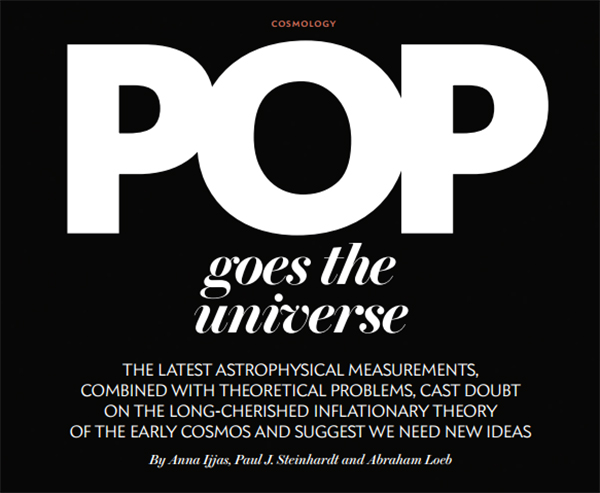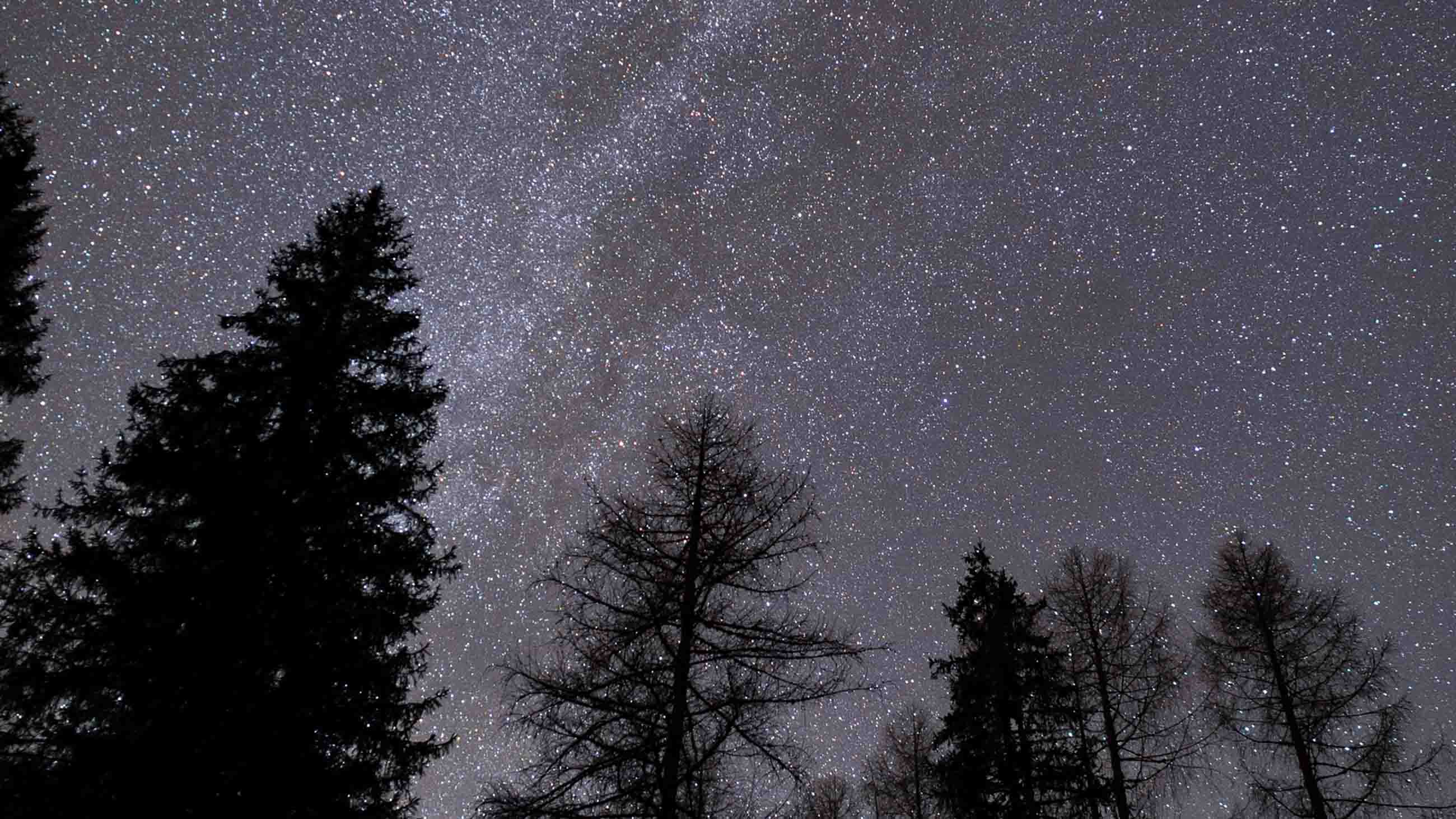A Debate Over Cosmic Inflation (and Editing at Scientific American) Gets Heated
A roiling debate about the origins of the universe has jumped from academic journals into the pages of Scientific American. The dispute revolves around what’s known as cosmic inflation, a widely accepted theory of how the universe expanded in the first moments of its history.
In the February issue of the magazine, theoretical physicists Anna Ijjas and Paul Steinhardt of Princeton, and Harvard’s Abraham Loeb, published a feature arguing that inflationary theory was probably wrong, and that the theory has become so open-ended that it is essentially unverifiable. The theory’s defenders, they write, have discarded “empirical testability” and started “promoting the idea of some kind of nonempirical science.”
That suggestion ruffled feathers among at least 33 prominent physicists, including Stephen Hawking at the University of Cambridge, four Nobel Prize laureates, and a Fields medalist — all of whom put their names to a response defending the empirical rigor of inflation models. The letter is scheduled to be published online at Scientific American this week, and in the July print issue.

In the magazine, the physicists suggested that inflation theory was flawed and called for “new ideas.”
David Kaiser, a physicist and historian of science at MIT who serves on Undark’s advisory board, sent an advance copy of the letter, which he co-authored and signed, to Undark on Monday. In an accompanying email message, Kaiser stated that the claims made by Ijjas et al had been “explicitly debunked several years ago,” and he questioned the judgment of the editors at Scientific American — among the oldest continually published magazines in the U.S. — for allowing the article’s authors to characterize the vast majority of researchers in the field “as if they were members of some cult.”
“I’m not here to say inflation is right,” Kaiser said in a follow-up phone call. “I’m just saying inflation gives us a testable set of questions and statements.”
Alan Guth, an MIT physicist who first proposed the inflation concept around 1980, told Undark that Ijjas and her colleagues were wrong to suggest that some scientists adhere to the theory of cosmic inflation even though they believe that it is untestable. “That’s totally outrageous,” Guth said. “It has no basis in fact whatever, as far as I know.”
Ijjas, Steinhardt, and Loeb all declined multiple requests for a telephone interview, but when asked via email if they could name any pro-inflation scientists who believe that the theory is nonetheless untestable, the trio pointed to a video of a 2014 panel during which Loeb asks Guth directly whether it’s possible to do an experiment that would falsify inflation.
The full exchange is below:
Guth and Loeb discuss cosmic inflation in 2014.
Ijjas and her colleagues also directed Undark to web page they’d prepared in response to the criticisms of their article. In a nutshell, the physicists stand by their argument, suggesting that the critics are misreading their work. “We have great respect for the scientists who signed the rebuttal to our article,” they wrote, “but we are disappointed by their response, which misses our key point: the differences between the inflationary theory once thought to be possible, and the theory as understood today.”
(Readers keen on digesting the full response are encouraged to visit the website for themselves.)
This is the third time in six years that Scientific American has published a challenge to inflationary cosmology. The magazine ran a print feature by Steinhardt in 2011, and a long Q&A with the physicist in 2014.
Still, the publication admits that it remains a fringe position. “It’s obvious that vastly more researchers favor the inflation idea than the alternative, and we’re certainly not pretending otherwise,” said Scientific American’s Clara Moskowitz, who edited the feature. “I don’t think that means that anyone who disagrees shouldn’t be allowed to have their say — in our pages or anywhere.”
This post has been updated to embed the full video exchange between Alan Guth and Abraham Loeb on the question of whether inflation theory is empirically testable.











Comments are automatically closed one year after article publication. Archived comments are below.
My dear, three times in six years after forty years that inflation has been non-succesfully around? ***Criticizing inflation three times***?! Off with their heads, I say. Thank God Almighty that they came to their senses and felt to their knees and host a deafeningly dumb reply as their feature article one month after the Incident.
Because that’s precisely what science needs today: Authority. Since mere theoretical work hasn’t worked out.
I’m afraid to say inflation is wrong. Big bang cosmology isn’t, just inflation. It’s a solution to a problem that doesn’t exist. But you have to understand how gravity works and what a black holes is to appreciate this. That’s because as Hawking said (http://news.bbc.co.uk/1/hi/sci/tech/4249192.stm), the universe is like a black hole in reverse. Unfortunately the idea of a bouncing universe is wrong too. I’ll make details public at a later date.
Both Inflation and Dark Energy are enormous patches to solve problems with Big Bang Theory. There was another, much earlier patch that doesn’t get much attention, but should.
When it was first apparent that redshift is directly proportional to distance in all directions, this suggested that we are at the exact center of the universe. Then the argument became that space itself is expanding, based on the premise of spacetime. The problem with this is that the central premise of Relativity is the speed of light remains Constant to the distance. Yet if the light from those distant galaxies is being redshifted, it cannot be Constant to this intergalactic distance, but is taking longer to cross, as the universe expands. This means there is one metric of space, based on the redshift of this intergalactic light, that is increasing and it is being compared to a stable metric, based on the speed of the same light. More lightyears, not expanding lightyears.
We are though, at the center of our point of view of the universe, so there might eventually be some consideration for an optical explanation of redshift.
According to Woit (“A Cosmic Controversy”, 10 May 2017, “Not Even Wrong” blog), ‘The simplest inflationary models whose “predictions” for Planck data are being discussed involve a single inflaton field, with no understanding of how this is supposed to couple to the rest of physics.’ Is understanding of the inflaton field related to the problem of understanding Milgrom’s MOND? Google “kroupa milgrom”.
I am disappointed that none of these articles give credit/(mention the name of) to Demos Kazanas show showed a year before Alan Guth that exponental expansion can solve the horizon problem.
While this bickering is going on, we have evidence that a varying speed of light is still changing right now, a testable prediction that can be verified with atomic clocks in space.